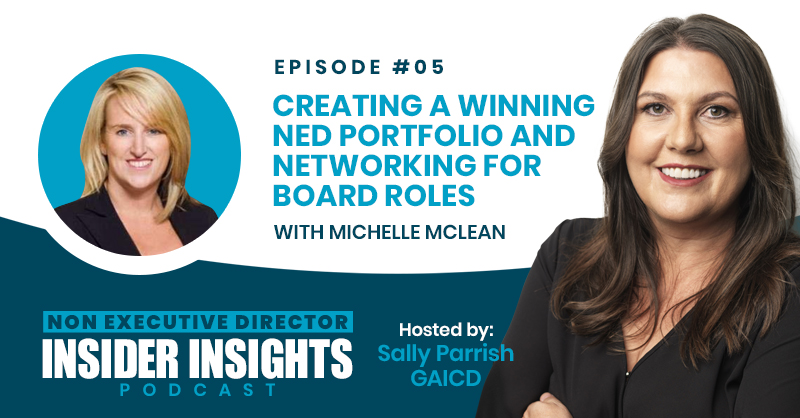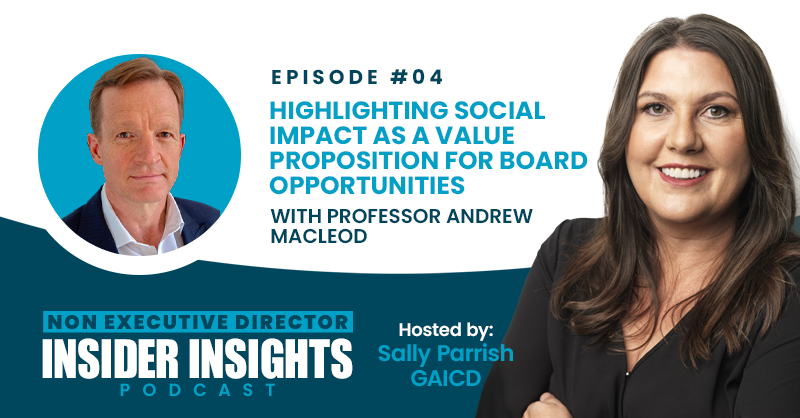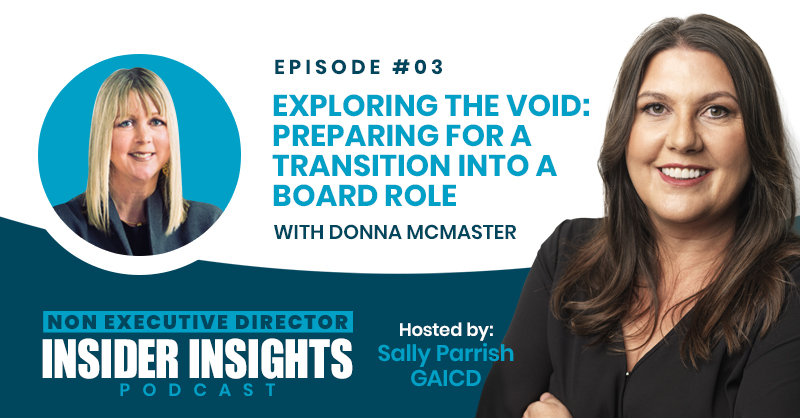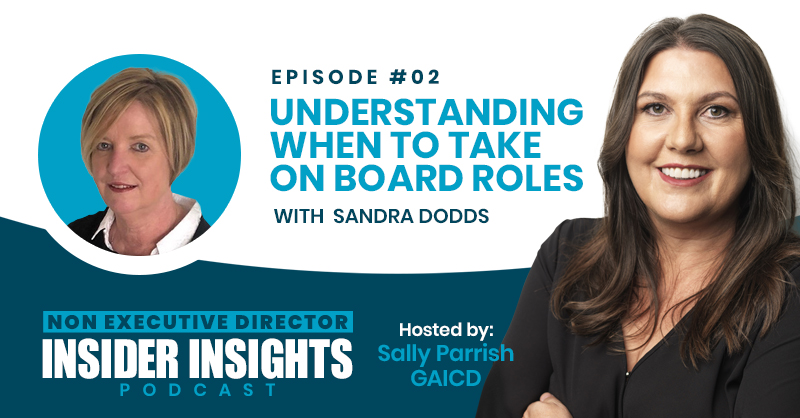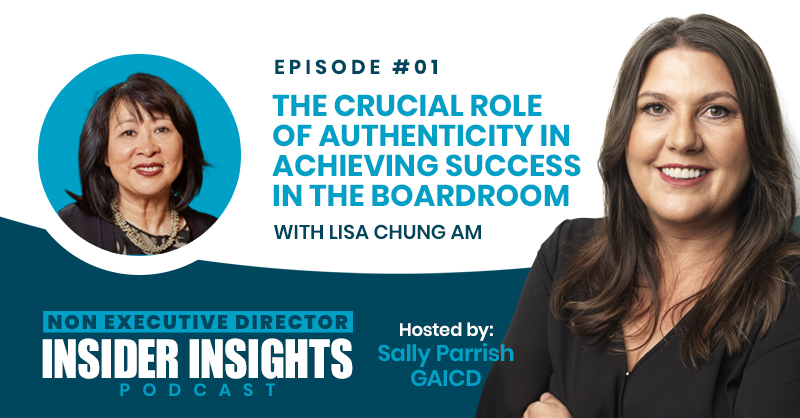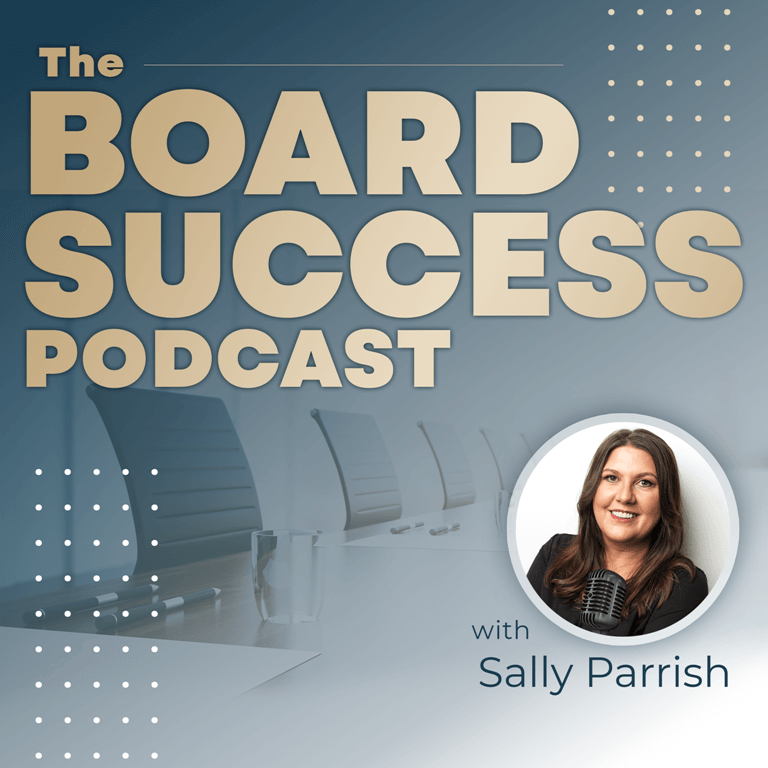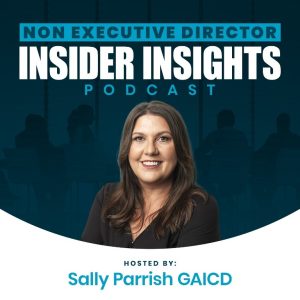Insider Insights Podcast Interview with Eric Morris
Episode 13: An Interview with Non Executive Director Eric Morris
Sally Parrish interviews Eric Morris
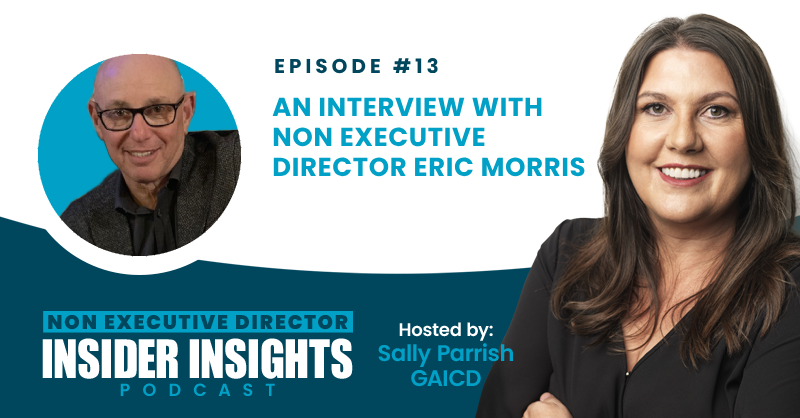
Eric Morris is a former Chief Executive at Brand Collective and today is the Managing Partner at Albany Advisory, Chairman of New Zealand based retail technology business eStar, Chair of Cue and Veronica Main and sits on the advisory board of Belgravia Apparel and Seafolly. He is also an advisor to active wear brand STAX.
He started The PAS Group under Private Equity in 2005, by acquiring a number of businesses in order to capitalise on the fragmented nature of the retail industry in Australia. After a number of successful acquisitions, and integrating the businesses into a group, the entity listed on the ASX in 2014. The group then went private post Covid, and acquired the Brand Collective business in 2022. Eric remained as CEO and ran the merged business for 18 months prior to retiring from his executive role and transitioning to the board.
Eric has enjoyed an extensive and successful executive career. Prior to his role at PAS, he was based in Hong Kong for 5 years running the Asia Pacific region for Reebok International, as well as for Disney Consumer Products and from there, was brought to Australia by Myer to start their private brand business.
FURTHER INFORMATION:
Meet Eric on Linkedin: https://www.linkedin.com/in/eric-morris-2b97656a/
Click Here to View the Podcast Interview Transcript with Non Executive Director Eric Morris
00:05 Hello and welcome to Insider Insight where you get to meet non-executive directors from go inside their boardroom. Today we're joined by Eric Morris who will give us his unique perspective of board life and offer up some hints and tips to help you to succeed too. Eric is a former chief executive at Brand Collective and today is the managing partner at Albany Advisory. He's currently serving as chairman of New Zealand based retail technology business Easter. He's also chair of Cue and Veronica Maine and he sits on the advisory boards of Belgravia Apparel and Sea Folly. Eric is also an advisor to activewear brand Stats. So join me now and let's hear from our insider Eric Morris.
00:54 Hi Eric, thank you so much for joining us today. It's great to have you here.
00:58 Thanks so much Sally. Thanks for inviting me.
01:01 I am really excited about this episode because we're going to talk about private boards. Now often we talk about ASX boards and not for profit, but this to me is where the real excitement and opportunity happens. There are thousands of private boards out there and they can make an incredible difference. So I'd like to start by asking you first of all, what do you enjoy about the private company space? What excites you most?
01:33 Yeah, I think it's the contribution you can make using your years of experience and being able to make a valuable contribution to the business, to the management team and um I think that's really rewarding.
01:49 Yeah, and look you've certainly had a lot of success both at the executive level and the board levels. So if we talk about your exact career, you had almost two decades in retail working initially for Pas Group and then through the merger in 2022 Brand Collective heading up those businesses in the chief executive role. What were some of the highlights of your years as an executive working within that brand?
02:17 I think when when we started Pas Group back in 2005, it was really a private equity business and I'd drawn a whiteboard which was going out and buying and building uh the group. So we did over a number of individual acquisitions all around the apparel footwear accessories space and amalgamated that into a group and really focused on that. We culminated in listing on the Australian Stock Exchange in 2014 and uh we went private again in 2020 just to cover it. Uh and also the amalgamation with what was then Brand Collective and forming a group which had uh circa 26 brands in the portfolio.
03:07 But that's like building it.
03:09 Yes.
03:10 I was going to say that sounds like a lot of fun and I'm I'm really curious as to how you make the jump from executive to board, right? Because they're very very different beasts. Executives very hands-on. It sounds like you've had a very meaty executive career where you've been extremely hands-on. You've been you know, up to your shoulders in implementation and execution and and at the front leading. How do you go from that to what is a very hands-off role on the board? How did you not make that transition in terms of how did you win that appointment but mentally mindset, how did you make that shift from one side to the other?
03:51 I think throughout my executive career, I had uh doing it for as long as I did, I've run that business for 18 years and um I really spent time in the boardroom and you can imagine 18 years of a board meeting every month.
04:06 Yes.
04:07 For 18 years and a variety of different iterations of boards uh through private equity, public and then private again. And what I always looked at is how board members operated and understanding the key differentiation between a chief executive and a board member and understanding what I would have wanted as a chief executive sitting on the other side of the table to maybe what I would get from some of the board members. So gave me a really good insight into how I would need to do it uh one day because I always knew at a point in time I would transition out of being an executive member to probably you know just being a board member. So I think that gave me a really good grounding on how should go about it. And the ability to see both sides like a foot in each camp so to in each camp so to speak. You understand what you want and need from a board and as a board you understand what you want and need from that CEO. That's a really great perspective to have.
05:10 But also to differentiate between the skills that's required.
05:14 Yes. You know, in any other business I want to make sure that I'm not trying to do the CEO's job because that's what he's paid to do. I'm there for a different purpose altogether.
05:25 Yeah.
05:26 And as long as I can add value, adding value is actually quite rewarding as well.
05:32 And there's a lot of there are a lot of uh very successful executives that can't make that transition and they're they're wired to be in the doing, right? They get in the way and boards we often see that on boards where discussions can get a little bit too detailed, a little bit too low level. So did you consciously make that decision that the board operates this way, the exact operates that way or do you think it was just from that being probably to those board meetings for all those years and you kind of trained yourself and you could almost intuitively spot the difference.
06:08 I think that's about right. You know, having done that and working through and understanding, I think it's always so important to be able to to have a thorough knowledge of each month's board pack before it comes out. And understand the business. Um you've also even you know, before you actually attend your first board meeting, absolutely critical to really understand the business. Understand all the uh elements of it, what the challenges are, what they're really good at and be able to you know, look through some old board papers. So by the time you get on board, you really understand it and can make a contribution.
06:50 Yeah, and so what would your tip be for making a contribution? Think about adding value, making a contribution. What do you think the best way that you can do that at board level?
07:00 I think it all depends on each individual circumstances. You know, a lot of the opportunities that come along they are with organizations who have enormous opportunities and potential. And I think it's also about having the rapport with the leadership team as well as with the other board members because I think one of the most rewarding elements that I've found is that with years of experience, people actually listen to what you have to say.
07:31 I love that.
07:33 Yeah.
07:33 Yeah. It's not really making up the numbers.
07:36 Yes.
07:37 Unfortunately quite often in public company boards, people are there to make up the numbers and to focus on governance.
07:43 Yeah.
07:44 I think it's not necessarily as supportive.
07:47 Yes. Yes. I want to talk about that transition. Like you had this substantial executive career, you worked on sizable boards, you were well known in the industry. How do you go from that to board? Because I know a lot of people struggle. They get pigeonholed, right? They get known for their doing and the implements and then it's hard for them to get others to understand their potential at that higher level. But how did you make that transition? How did that happen to you?
08:22 I think a lot of it is about awareness and making sure as you're going through the early stages of uh sitting in some of these board meetings, it's not talking for the sake of talking. It's talking when you can make a contribution. Okay? And it's amazing how people will refer to you once you start making a contribution. And I think that's an important part also.
08:46 Yes. Um you know quite often people feel like I'm sitting at a board meeting, I better make I better say something because just say something but all they do is they don't ever do that. Sometimes less is more. About saying the right things and asking the right questions.
09:02 We actually say that we say that a quality of a non-executive director is knowing when to speak, knowing what's the part where I can add value, what's the part where my opinion is going to matter to this conversation.
09:15 And it's about the questions you ask and how you ask questions.
09:20 Yeah, and we were talking offline about you know, being being careful around the CEO when you're questioning the CEO. It's got to come across that you're working together, that you're not there to undermine that CEO. So how would your how would your question to a CEO reflect that kind of respect that they're running the show, that they're in charge?
09:43 I think it shouldn't be done in a challenging manner, but I think it's inquiring as well. Uh it's about having an inquiring mind. You know, asking why things are a certain way, but also really just understanding it and uh
10:00 P
10:00 And sometimes see in the chair roles that I do have the ability to have regular catch up with the CEO before board meetings. Rather once a week or once every second week. So I'm really understanding the business before I sit around the table. That's in a chair role. I wouldn't do that in front of the other.
10:20 Yes, yes. As a chair you've got the opportunity to meet with the CEO to ask questions from an understanding perspective. You know that that why question can lead to very defensive answers. Kind of why you doing this? So having the right tone and the right language around those questions that you're asking. And it's not about asking the CEO questions to prove to the other board members that you know what you're doing.
10:47 Because that would just irritate the CEO.
10:52 So it's it's power source. It's a minefield, isn't it? The boardroom having the right relationships with the right people, the right dynamics is a lot to it, isn't it?
11:03 Now your first board, as I understand it was having tendered your resignation you were asked to join the board. Will you talk us about that?
11:12 Yeah. I actually made the decision a few months before I left the organization. I met with the current owner and I said you know after 8 years I think it's time we brought the two businesses together, bring new brands, new opportunities. And the first question he asked me was what am I going to do? And I told him. And he said well can we be the first? I loved that.
11:36 Oh, that was great.
11:38 Yeah, a little bit more challenging having an ex-CEO with a new CEO also sit around the table. That's a different one altogether. But it certainly was a good start. Strange thing about these type of roles is the more you have the more people want you. It's about getting your first. I was also approached similar time for another CEO and I said I wasn't interested. He then asked me to meet me under the business which I did and he tried to convince me to take a CEO role. I said no so he said okay well will you join our board? So that was
12:15 We value your expertise and we're going to get a lot of value from that. That was the kind of the second one and then a few followed from there.
12:24 And so I can't really, I always talk about value proposition and purpose, right? There's a lot of non-executive directors out there that they you know they have a lot of coffee meetings, they get their resume out there, they look at directory listings and they apply for everything and sometimes they get lucky and they get a role. But I'm really about if you figure out your value proposition and you understand your sweet spot, what what is it that I can bring to a business? That will create opportunities, solve problems, mitigate risk. I think once you really tune into that the board space literally opens up for you. It's a matter like you say of getting that first role and proving yourself. And I love how you say the more you have the more approaches you get. Do you feel that that's been a deliberate intention on your part to figure out your value proposition and to live with that or how that kind of I think it's been a bit of an organic the way it's actually worked out. I think what I said earlier about understanding what boards require and what CEOs require and then to be able to work it from there. And you know just that it's no surprise that most of my board roles are in a similar space in some industry or related industry. John Lewis is a retail technology business in there as well. But I think they and this is the unfortunate thing which happens in the market is you do tend to get pigeonholed and you know just something like a strong retail background like I have. The retail applies to everything.
13:59 Yes. It's not only the retail stores but the from a digital perspective. It's not only apparel could be anything.
14:08 Yes. Anything with its customer involved, with its strategy involved, with its service levels involved and product. And I think the most important part for any organization is to ensure that they have a USP, a unique selling proposition of the products that they have and make that as clear as you can and that's how you differentiate. And attract people that are in alignment with that. You know if your brand speaks to integrity you want board members who lead with integrity. So getting really clear on that USP for the business but getting really clear on that that USP for the non-executive director, that brand position and that value proposition.
14:53 Really.
14:54 But no I think it would be great in my own portfolio to have something which wasn't in the exact space. I'd love to be able to utilize my skills in a slightly different space but still the same thing, it really is. I have to learn as you climb the tree is that it sometimes doesn't really matter what you're selling. I often use this saying to people we could be selling ornaments.
15:16 Yes. Because that makes any difference. The concepts exactly the same. You still got customers, you still got technology and brand online presence, all of that and it's all the same kind of thing.
15:28 Yeah and ultimately if you chunk it up in any business it gets to the same things like strategy, risk, operations.
15:33 Yes. It's all the same. And it's how you navigate that. I love I love that perspective.
15:39 Talk to me about the day-to-day of managing your portfolio because you've got your advisory business that you're running. Tell us a bit about that and what you're doing at Almany Advisory.
15:50 Almany Advisory, I started it out initially really as a means to like it to be able to invoice my services out of that. Okay. I had it see evolved somewhat when my wife who is really has significant expertise in digital transformation, loyalty and customer. And she joined the Almany Advisory team and you know we focus on her part of the business on digital transformation, a lot about customer strategy, loyalty, etcetera. And she's working with a lot of the large retail businesses in Australia.
16:30 It sounds like you can't help yourself but be a massive success at anything you get involved in.
16:36 Yeah, I think when it always people talk about retiring and yeah, I've asked about retired from executive role but I haven't retired.
16:45 Yes. Yeah, we talked about all for retirement now and there's a lot of research around keeping your mind busy, keeping your body active in retirement and I think board roles are absolutely terrific for doing that. When you take someone like yourself that has decades of experience, mean who wouldn't want that on their boards, right?
17:05 So how do you manage the portfolio that you have? You've you've got your Almany Advisory, you've got your non-executive roles, you've got your chair roles, you've got the advisory board roles. What what are the challenges of being a non-executive director and across all of those things?
17:24 Well they all have different time demands. So for example the two plotting one where I'm an executive chair for the last 50 months or so. I'm probably a little bit more involved in that business than I am in some of the others. So that takes a little bit more of my time. The other ones are all a little different. Some of them are once a month and then maybe it's meeting the CEO once a week or once every three weeks. So they might be significant something that's happening in their business that you get involved with. But it's about juggling priorities. And I think running the business that I did which had as many brands and divisions that I had. It was all about juggling priorities and so it's just slightly different.
18:10 But you know I like to think I'm an organized person.
18:14 Yes. And
18:15 Yeah.
18:16 You work it all out.
18:18 Yeah, I love that. When you're evaluating a new role, a new board role, do you look at the frequency of meetings, the duration of meetings? Is that a consideration for you or is it more the realistic is this a good fit? Can I add value?
18:33 I think the starting point is is it a good fit and can I add value? Secondary who are like the business itself, what are the opportunities for the business? Who are like the executive team, the CEO, etcetera. And what about the other board members or owners depending on the structure of which organization because I think you know you reach a stage where you can pick and choose what you want to do. And it's always best to work with people you like and with brands you like and opportunities that you think are there.
19:06 Yeah and when you do that you make a bigger difference, you make a bigger contribution, there's a better version of you that turns up. You're more appealing, you're working more magic and that is attractive to other boards then, right? So it kind of feeds the next role. I think I think non-executive directors sometimes they rush into roles that aren't a good fit and they don't really see the problem in that. But the wrong board for you can really set you back. There's no opportunity to shine and boards where there are conflicts between non-executive directors or factions there's a really really tricky step there. If you're not if you're taking on a role that's not right for you, if you're not being really truly and doing that due diligence. I think it's actually a step back rather than a step.
20:00 Forward. What are your thoughts?
20:02 I absolutely agree with you. I think that's where it's really important. And I've done this with virtually all of the roles that I've taken on is taking time to understand the business first. Even for example, the New Zealand business, I started out and started as a chair of that business. I started out as a board member. But before accepting the role, I went and attended a board meeting as an observer. And wanted to see and feel the dynamics of it. I actually made some comments during the meeting as an observer. And it was an opportunity for both parties to try before you buy.
20:41 But that's actually quite a good idea to see if it's a good fit and if you can like because there's nothing worse I think than after spending many years in an executive role landing in organizations where it's just a wrong fit.
20:55 Yeah, and I think don't ever cry and do it for the money.
20:58 Absolutely. I'm glad you said that actually. I'm glad that you said that. I mean, exact roles you can go with who pays you the most money but board roles seriously some of the best roles you don't get paid for.
21:11 Yeah. Some of the most fulfilling roles of voluntary rewarding ones as well.
21:16 Yes, absolutely.
21:18 Um I want to ask you your top tips for anybody starting out. But before I do that, the burning question that anybody listening to this would have is this private organizations where you're on the board and the owner of the business is very much in the business even on that board. They can be really tricky to navigate. So can you talk through how that might be different to a board that has, you know, everyone's independent on the board. They're not involved in the business. How is that different when you're working with someone that maybe created the company or it's second generation, third generation. How do you navigate that?
22:01 Well, I think they're all again a little bit different. I was quite well experienced in doing it because when we first started past group in under private equity and went out and bought all of these businesses. And some of those we kept the owners in for a period of time. So it was kind of working with them, understanding what drives them is important. But a lot of the other ones now I'm getting approached is the owners approaching me.
22:29 Right. Okay. So they want the help, they want the assistance. So I think that helps a great deal is that there'll be nothing worse than being kind of implanted there by another party because they need the CEO as a complete trade to what they do.
22:45 Yeah. And I think that's a key point there that some time not any of the boards or businesses that you've been involved in Eric obviously. But sometimes there are private businesses out there where the owner is on the board and doesn't want the board there or wants to tell the board what to do, right?
23:07 Yes.
23:08 I think I would have if that happened, I'd have quite with the owner. The owner and say what is the purpose of having a board? Don't have a board. Just run it yourself the way you always have.
23:17 Yeah, I think sometimes there's there's some boards that are grateful to have the position on their resumes and sometimes they're owners of the business that are grateful to have them there. So I guess that really comes down to due diligence, right? Asking the right questions. Why the board here? What do you value in the board? And that observership would really help to do.
23:40 Okay. So a lot of the executives listening to this podcast, they're either thinking about making the leap to boards or they're maybe starting out perhaps they're volunteering on a not for profit to get some experience or they've just landed their first board role. What advice do you have for those that are starting out today?
24:03 I think as a starting point it's building networks. It's really important. You know, when you're in an executive role, you generally have got some reasonably strong networks. And I've always had the view to, you know, take as many meetings as I can in my executive role. Meet as many people as I can. There's a point in time where it just becomes overwhelming and you can't do it. But I think you build up really strong networks during your executive career. It's about nurturing them as well. Catching up with people. And I think one of the most powerful things that I find is catching up with people not because you want something from them. Okay? And I think there's a very clear differentiation between just catching up and finding out about how they're doing, what they're doing as opposed to them feeling like that you want something from them. Because in that you're causing.
25:01 Yeah, and I think that could be quite liberating because there are a lot of a lot of aspiring that out there that are having lots of coffee meetings. And they're not sure why they're having them or what they should be saying or what they're doing. They're just told do lots of networking so they do and they get into these really awkward situations where they're not really sure should they be selling themselves or should they be asking questions. So I think that would be really liberating for a lot of people.
25:30 Yeah.
25:31 As you said, the most powerful thing is when you're talking to somebody, you phone someone up and you're not wanting something from them.
25:39 Yeah, you're just curious about who they are, what they're doing. I think that's really powerful.
25:44 Yeah, I love that. I love that. Can I ask you to put your chair hat on and imagine you're in a situation where you're hiring for a non-executive director. And what we see is that either the boards open the floodgates saying that with thousands of applications or they try to hone it you know one to one who do you know type basis. When you've got applications coming in, when you're seeing resumes, when you're seeing lots of board resumes. What really stands out to you in terms of things people can do well and things that people do quite poorly?
26:25 That's a very good question, Sally. I think one of the most important assets and I had this conversation with somebody the other day. Uh we were looking to maybe bring on a couple of new board directors. Saying let's determine exactly what the skill set is that we need. Okay? This isn't about is no one has the biggest organization most people around.
26:46 Yes. So what is the skill set we need?
26:49 And it's just arguments say it's logistics. Then we need to work out finding a logistics person who's an expert in the field who and it's like anything else, who's a good fit.
27:04 I often used to use the terminology when hiring for you know divisional heads or anything else in my executive role. I used to say well if I was looking for a that mate, how would that person fit? Yeah, but how would I live with them? Because they're going to live with us for a long period of time. That's a good insight. And probably that applies to the people you work with.
27:26 Yes.
27:27 So it's got to be a really good rapport. And it's not that although we've got someone starting today, we're going to have that meeting and it's really key, we don't want to do that. But I think that's probably the most important part and it's the same as any organization.
27:44 I certainly get that vibe Eric because I'm sending you resumes and I'm great in logistics. I've been in this industry for 20 years. You're bringing me in, how do you how do you get the vibe to know whether someone's going to be a good fit? But sometimes it's difficult you can get that narrow down but I'm very much a person who enjoys face to face. Uh because there's no substitute for that. And being able to have a coffee with someone, just understand them, understand what they can contribute and understand them as a person, what drives them as a person. Be good when you go out for dinner and you might have a board dinner, whoever might be. To be able to go out and enjoy the people you're with and have topics of conversation outside of work which is enriching for everybody.
28:29 Yeah, so having those parts where you have things in common so that you've got the rapport and that can facilitate the decision making and the complex critical thinking. But also having the the point of difference so that we've got the innovation and the creativity as well. So you don't want two same either, right?
28:50 No, I think you know we talk about diversity particularly around public company boards. It's very topical these days. It's become more topical often since from uh ideas like in America. But as far as I'm concerned, I think diversity is around diversity of process. And this certainly applies in private or public company boards. It's no use having five accountants on a board or five lawyers. Okay? It's having an accountant and a lawyer and this and that and having the diversity in process.
29:22 Yeah, that and then obviously there's gender and all the other things that come through but the most important factor is about the resume process.
29:31 Yeah, I love it. I love it. We're coming to the end of our episode here, Eric. I feel like we could keep talking to you about the private space forever. But in a final question, if an executive out there and they are particularly targeting the private space. What advice could you give to them about where to find roles or how to position themselves for that type of board structure?
30:00 I think probably similar to what I said earlier, it's about your networks. Probably also about utilizing things like LinkedIn. Although you've got to be able to stand out from the crowd. Because it's how you use it. There's so many people on LinkedIn, how do you differentiate yourself? So many strategic thinkers, right? Everyone's a strategic thinker in this space.
30:26 So we've talked earlier about a USP for an organization. What is your personal USP?
30:35 And how to sell your personal USP in short.
30:38 Yeah, a lot of times we say so, you know, what are you doing? Well, it's kind of like you're not ready. You haven't figured it out and you don't know exactly what that is. And and also it's not just your it's not just your personal USP, your value proposition, but it's why do you want to be on this board? Like it's so not I want to be on the board for my resume or for the money it's going to pay me, but what do you want to bring? Where do you want to see this business go as part of joining the business? That's equally important too, right?
31:09 Very cool. Absolutely very cool.
31:12 Eric, thank you so much for joining us today. For anybody listening, if you'd like to get in contact with Eric, please do so either through LinkedIn or reach out to Albany Advisory and he's love to hear from you. Eric, thank you so much for joining us today and sharing your insights.
31:29 My pleasure, Sally. Thanks for the invitation.
31:34 You've been listening to Insider Insights with Sally Perish. Insider Insights is the place to meet non-executive directors and go inside their boardroom to learn from their experience. We hope you've discovered some great learnings today that you can apply to your board role. We look forward to your company on the next episode of Insider Insights.
